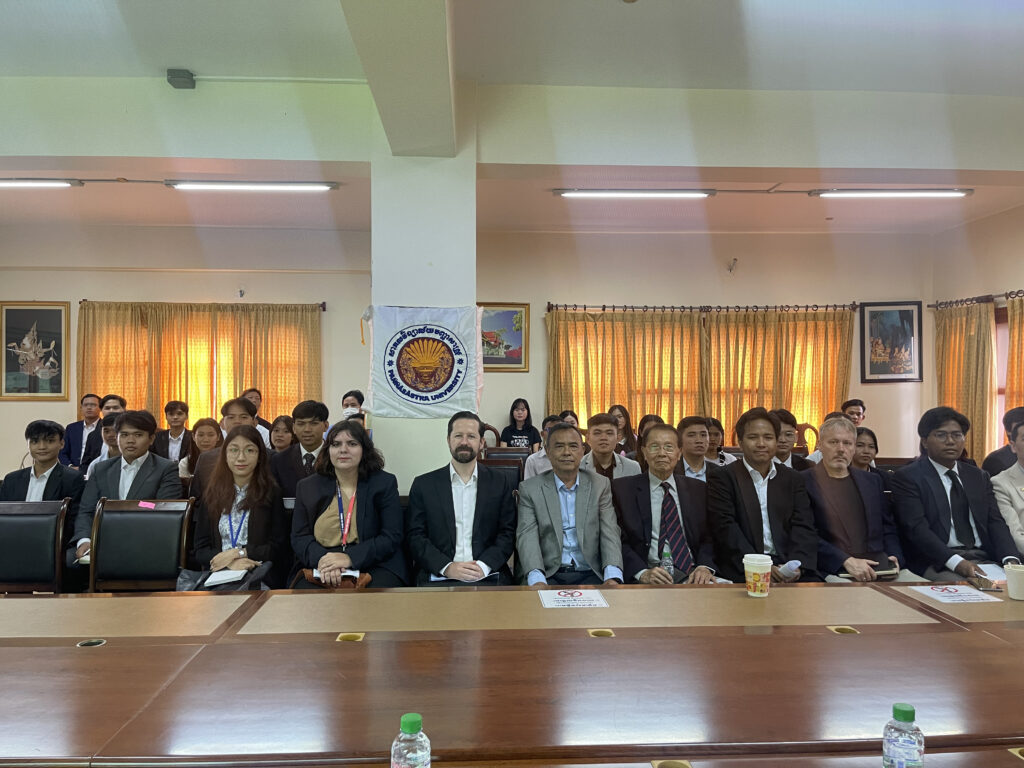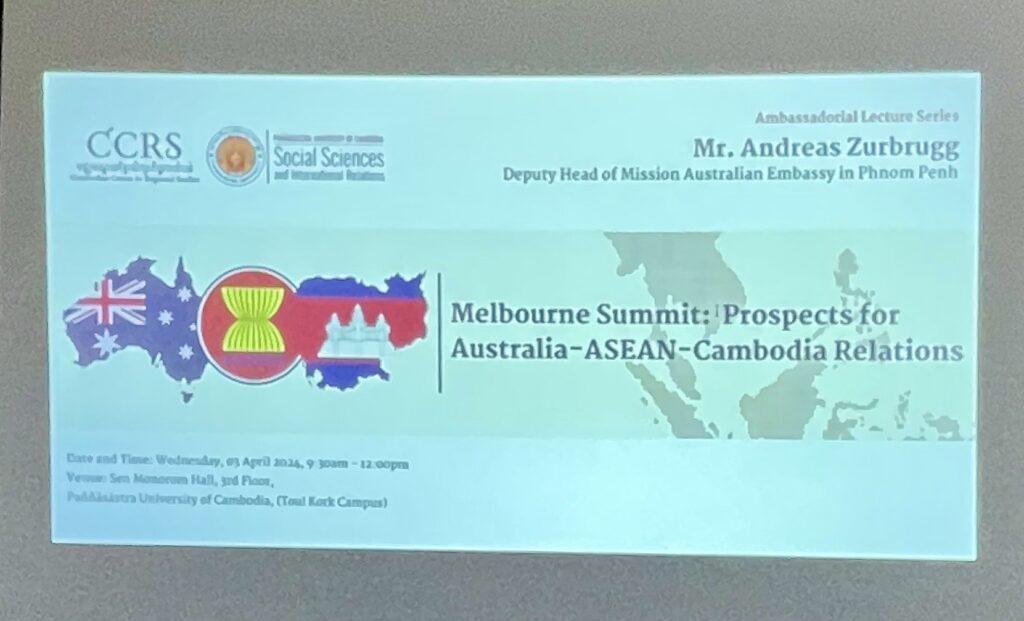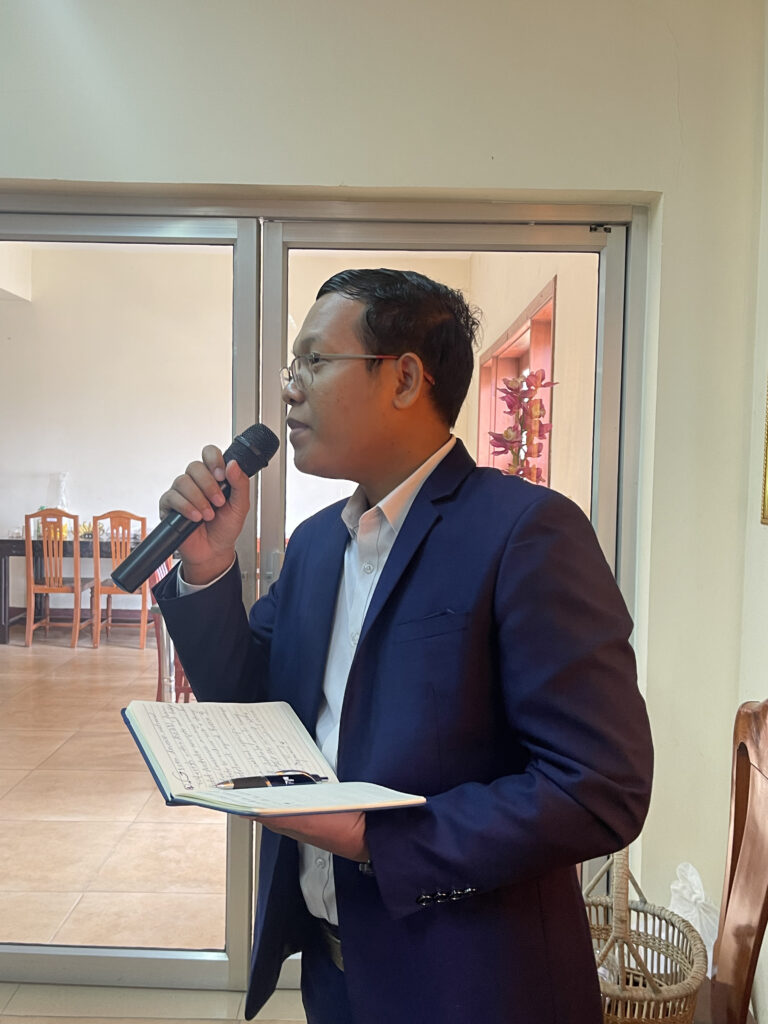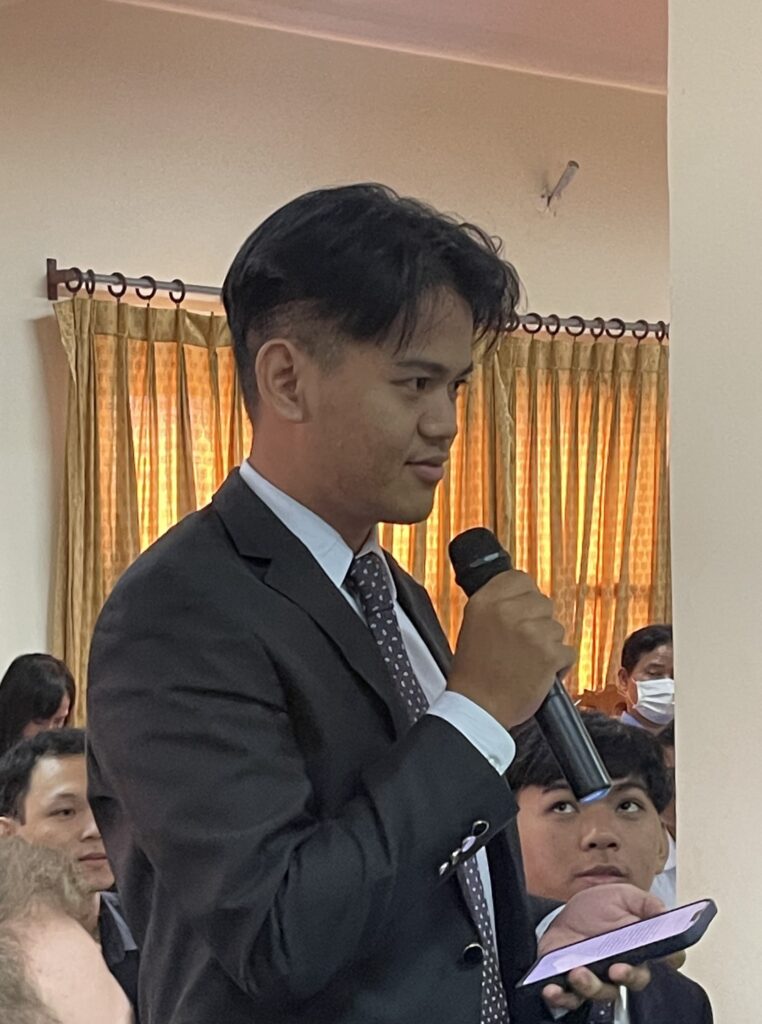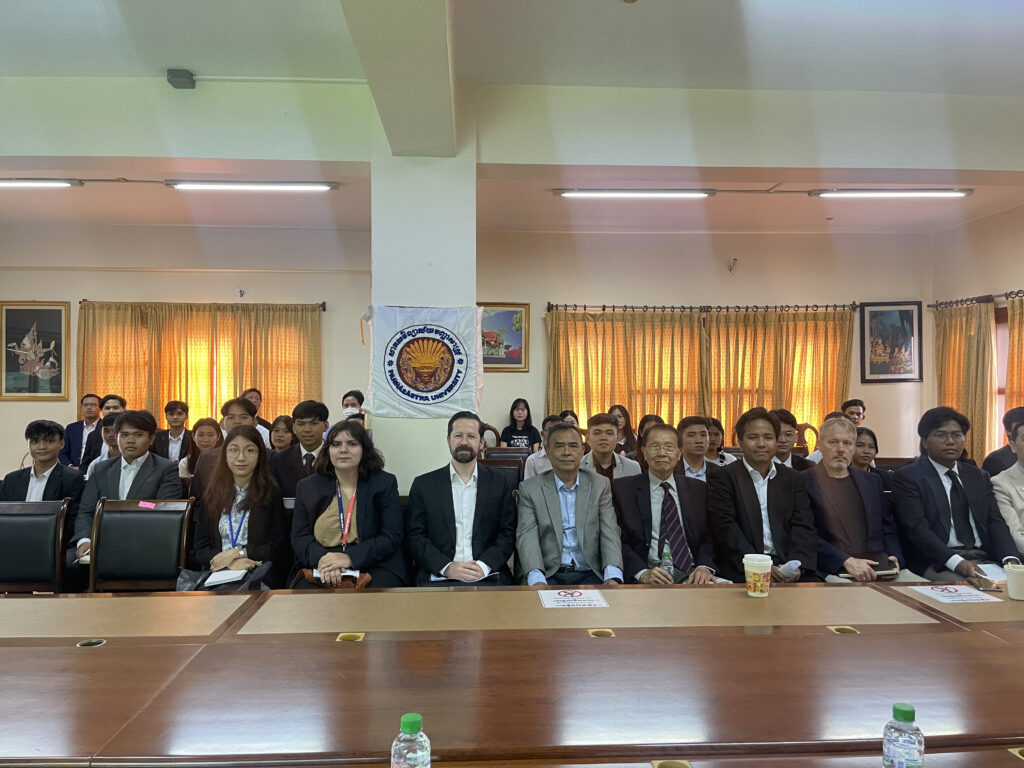On 3 April 2024, from 9:30am to 12:00pm at Paññāsāstra University of Cambodia (Toul Kork Campus), CCRS organized a Public Lecture on “Melbourne Summit: Prospects for Australia-ASEAN-Cambodia Relations” featuring Mr. Andreas Zurbrugg, Deputy Head of Mission of the Australian Embassy to Cambodia.
There were 50 participants including CCRS’ researchers, IR students from Paññāsāstra University, academics, think tankers, journalists as well as diplomatic corps from the embassies of Australia, the European Union, France, Japan, and Singapore.
Mr. Him Raksmey, Executive Director of CCRS, welcomed all the participants to the event. He expressed his appreciation to the Deputy Ambassador of Australia to Cambodia for taking the time to share his view on the recent ASEAN-Australia Special Summit. He also conveyed his thanks to Prof. Kevin Nauen, Dean of the Faculty of Social Sciences and International Relations, PUC, and Senior Fellow, CCRS, for co-organizing this lecture. He emphasized that Australia is a vital partner and supporter of Cambodia and ASEAN. He laid out the context of the public lecture, of which the distinguished speaker would share his viewpoint on the outlook of Australia-Cambodia relations, and Australia-ASEAN relations in the context of the outcomes of the recent Melbourne Special Summit, including an assessment of Australia’s priorities in Cambodia and the region, why the Australia-Cambodia-ASEAN relations matter to each other, productive ways for Cambodia and Australia can work together to further enhance the bilateral relations, and how to advance the Comprehensive Strategic Partnership between the two sides to become more substantive and meaningful.
Mr. Zurbrugg gave a brilliant presentation, sharing his observation that the current regional landscape has become more and more complex with increasing challenges, from the issues related to traditional political security (South China Sea, Taiwan, Myanmar, Russian invasion of Ukraine, Gaza-Israeli conflict…) to the emerging non-traditional security threats (Climate Change, Artificial Intelligence…). The focus of his presentation covers three important parts: (1) how Australia sees itself in the regional context; (2) The recent Melbourne Summit; (3) Australia-Cambodia Relations.
For the first part, DCM Zurbrugg emphasized the values and ideas that shape Australian foreign policy today, setting out Australia’s international engagement amidst the complex external environment Australia faces, and the need for purposeful coordination for how the country best protects and enhances its interests and influence. Australia wholeheartedly supports and defends the international rule-based system, upholding democracy, human rights, and free trade. Canberra sought strategic balance and strategic equilibrium to keep the region peaceful, stable, and prosperous through effective defense deterrence and skillful diplomacy amidst great power rivalry. For Australia, ASEAN played a central role guided by the grouping’s outlook on the Indo-Pacific (AOIP).
For the second part, Mr. Zurbrugg laid out the four main themes of the Special Summit as the following: (1) trade and investment; (2) clean energy; (3) maritime cooperation; and (4) emerging leaders. Among all of those themes, Mr. Zurbrugg stressed that Australia is keen to promote trade and Australian investment in the region. He then explained articulately the four points accordingly. Furthermore, Australia has come up with various initiatives to boost Australia – ASEAN CPS, whereby Canberra will inject USD 1.3 billion to boost trade and investment, and another USD 140 million for the Mekong-Australia Partnership.
For the last point, Mr. Zurbrugg pointed out that Australia took part in the Cambodian peace process by crafting the 1991 Paris Peace Agreement for Cambodia and the United Nations Transitional Authority in Cambodia (UNTAC). Nearly 60,000 Cambodians call Australia home. Australia has also consistently supported Cambodian development since the 1990s with the accumulative official development assistance of around USD 1.3 billion. Beyond the traditional relations of “peace, people, and poverty alleviation”, Australia is looking forward to stepping up relations with Cambodia with a new development plan which will evolve around three main themes of “resilience, inclusive, and governance” and will align with the latest national development plan of Cambodia known as the Pentagon Strategy. Australia remains keen to assist Cambodia in making improvements to people’s livelihood, promoting business and trade, working in partnership in defense cooperation, as well as working on democratic and human rights values.
During the Q and A, there was an interactive engagement between the speaker and the participant. Addressing key questions related to Australia’s approach in narrowing the gap in the practice and perception when dealing with norms and values, Mr. Zurbrugg explained that Australia has its principles and norms when dealing with such global values such as rules-based international order, democracy, and human rights. Australia avoids preaching and prefers to share practical experiences and engage in dialogue with Cambodia to cultivate better understanding and promote collaboration on sensitive issues such as how to promote democracy and human rights. Answering another important question related to strategic balance amidst great power rivalry, Australia will work hand in hand with ASEAN and other partners to reduce the U.S.-China rivalry which carries profound implications for the security architecture in the Indo-Pacific region. The rivalry is a main driver of the region’s political polarization and Australia is keen to capitalize on defense deterrence in seeking strategic equilibrium among the powers so that they can stabilize their rivalry and expand channels for communication, as well as increase dialogues and diplomatic flexibility in managing disputes. All powers should respect rule-based international order and refrain from coercion and the use of military might to settle disputes.
In closing, Amb. Pou Sothirak shared his observations on Australia’s contributions for Cambodia. He mentioned that Australia is a great democratic nation and the country’s footprint in Cambodia has been remarkably visible. Australian foreign policy toward Cambodia had been well-known during the search for lasting political solutions to end the protracted conflicts from the late 1980s to the early 1990s. The Australian government exhibited skillful diplomatic to restore the second Kingdom of Cambodia through the signing of the Paris Peace Agreement in November 1991 and subsequently assumed a large role in the works of the United Nations Transitional Authority in Cambodia (UNTAC), a United Nations peace-keeping body set up in Cambodia in 1991.
Both countries belong to the ASEAN-Australia-New Zealand Free Trade Agreement, trade between Cambodia and Australia has been growing rapidly with Australia listed as Cambodia’s 18th most important trading nation. Furthermore, both countries are working closely to combat people smuggling, human trafficking, child sex tourism, narcotics trafficking, and terrorism. Australia provides aid to help Cambodia reduce poverty and work towards the Millennium Development Goals. This includes addressing high rates of child and maternal health (MDG 4 and 5) and rural poverty (MDG 1). Australia has also played a long-term role supporting Cambodia’s agriculture sector, including by helping to establish the Cambodian Agricultural Research and Development Institute (CARDI) and through subsequent agriculture programs which helped rehabilitate Cambodia’s irrigation system and agricultural production.
Amb. Pou offered three key takeaways from the public lecture:
1. Cambodia and Australia should work to turn challenges into opportunities. Cambodia needs to be more sensitive to what Australia consider as challenges to the region and vice versa. They need to also converge on the collaboration aspect of what they see as opportunity for both sides to boost their comprehensive strategic partnership.
2. Cambodia should look forward to attract investment from Australia on the potential in Cambodian sectors such as automotive, agriculture development, tourism, technology and innovation, education, logistics and supply chains, and mining. Cambodia should capitalize on the triple standard of the transformative role of high-quality Australian investment in driving Cambodia’s economic expansion and diversification, including skill and digital training.
3. If Australia and ASEAN to make their CSP a reality, both sides need to address geostrategic and geopolitical challenges which is triggered dangerously in the Indo-pacific region due to big powers competition. Cambodia and Australia should work together closely to ensure that tensions are remove and conflicts are avoided.
On behalf of CCRS, Amb. Pou expressed appreciation to DCM Zurbrugg for the interesting lecture and discussion. CCRS is thankful to Prof. Kevin Nauen, Dean of Faculty of Social Sciences and International Relations, PUC, for supporting this event. He also thanked esteemed members of the diplomatic corps and all participants for actively attending this public lecture.
The event was concluded in a friendly and cordial atmosphere.
